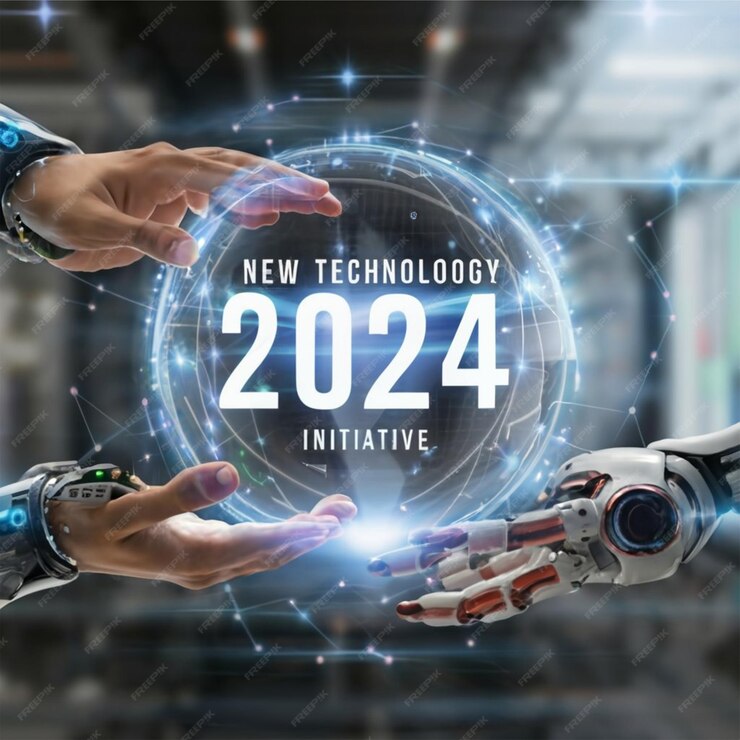In the ever-evolving landscape of technology, artificial intelligence (AI) continues to be a driving force behind innovation and transformation across various industries. From enhancing efficiency to enabling breakthroughs in healthcare and revolutionizing customer experiences, AI is undoubtedly at the forefront of today’s technological advancements. As we delve into the intricacies of this dynamic field, let’s explore the top AI trends that are shaping our world today.
Table of Content
- AI-Powered Automation
- Conversational AI and Natural Language Processing (NLP).
- AI in Healthcare
- Ethical Ai and Responsible AI Adoption
- Edge Ai and loT Integration
- AI-Enchanced Cybersecurity
- Ai in Finance and Fintech
- Generative AI and Creative Applications
- Ai for Climate change and Sustainability
- AI Governance and Regulation
- Conclusion
AI-Powered Automation:

Automation has been a buzzword for quite some time now, but AI is taking it to new heights. Organizations are increasingly leveraging AI algorithms and machine learning models to automate repetitive tasks, streamline operations, and drive productivity. Whether it’s automating customer service inquiries, optimizing supply chain logistics, or automating routine administrative tasks, AI-powered automation is revolutionizing how businesses operate.
Conversational AI and Natural Language Processing (NLP):

Conversational AI platforms and NLP technologies are transforming the way we interact with machines. Virtual assistants like Siri, Alexa, and Google Assistant have become ubiquitous, allowing users to perform tasks, get information, and control smart devices using natural language commands. With advancements in NLP, these virtual assistants can now understand context, sentiment, and intent, enabling more human-like interactions and personalized experiences.
AI in Healthcare:

AI is making significant strides in revolutionizing healthcare by improving diagnostics, personalized treatment plans, and patient care. Machine learning algorithms are being trained on vast amounts of medical data to identify patterns and make accurate predictions, leading to early disease detection and more effective treatments. From medical imaging and genomics to drug discovery and telemedicine, AI is reshaping every aspect of the healthcare industry, ultimately saving lives and improving outcomes.
Ethical AI and Responsible AI Adoption:

As AI technologies become more pervasive, concerns about ethics, bias, and data privacy are coming to the forefront. There’s a growing emphasis on ensuring that AI systems are developed and deployed responsibly, with transparency, fairness, and accountability in mind. Organizations are investing in ethical AI frameworks, bias detection tools, and responsible AI training to mitigate the risks associated with AI-powered decision-making.
Edge AI and IoT Integration:

The proliferation of Internet of Things (IoT) devices is generating vast amounts of data at the edge of networks. Edge AI, which involves running AI algorithms directly on IoT devices or at the edge of the network, is gaining traction as a way to process and analyze data in real-time, reduce latency, and improve efficiency. From smart homes and cities to industrial IoT applications, edge AI is unlocking new possibilities for automation, predictive maintenance, and intelligent decision-making.
AI-Enhanced Cybersecurity:

With cyber threats becoming increasingly sophisticated, traditional cybersecurity measures are no longer sufficient. AI-powered cybersecurity solutions are leveraging machine learning and behavioral analytics to detect and respond to cyber threats in real-time. These AI-enhanced systems can analyze vast amounts of data to identify anomalies, predict attacks, and adapt defenses proactively, thereby strengthening cybersecurity postures across organizations.
AI in Finance and Fintech:

The finance industry is embracing AI technologies to streamline processes, enhance decision-making, and deliver personalized services to customers. From algorithmic trading and fraud detection to credit scoring and robo-advisors, AI is transforming every aspect of banking and finance. Fintech startups are leveraging AI to disrupt traditional banking models, offering innovative solutions that are more efficient, accessible, and customer-centric.
Generative AI and Creative Applications:

Generative AI models, such as Generative Adversarial Networks (GANs) and transformers, are pushing the boundaries of creativity and artistic expression. These AI algorithms can generate realistic images, videos, music, and even text that mimic human creativity. From generating photorealistic artwork to composing music and writing poetry, generative AI is inspiring new forms of artistic collaboration and expression.
AI for Climate Change and Sustainability:

AI is being harnessed as a powerful tool to address some of the most pressing challenges related to climate change and sustainability. From optimizing energy consumption and resource management to predicting extreme weather events and monitoring environmental changes, AI is helping governments, organizations, and communities make data-driven decisions to mitigate the impact of climate change and build a more sustainable future.
AI Governance and Regulation:

As AI technologies continue to advance, there’s a growing need for governance frameworks and regulations to ensure ethical use, accountability, and transparency. Governments and international organizations are grappling with complex issues such as data privacy, algorithmic bias, and autonomous decision-making. Establishing AI governance bodies, standards, and guidelines is essential to foster trust, mitigate risks, and maximize the societal benefits of AI technologies.
Conclusion
In conclusion, artificial intelligence is driving transformative change across various domains, from healthcare and finance to cybersecurity and sustainability. As we navigate this rapidly evolving landscape, it’s crucial to embrace AI responsibly, ensuring that it is used ethically, transparently, and for the benefit of humanity. By staying abreast of the latest AI trends and innovations, we can harness the full potential of AI to tackle some of the most pressing challenges and create a better future for all.


